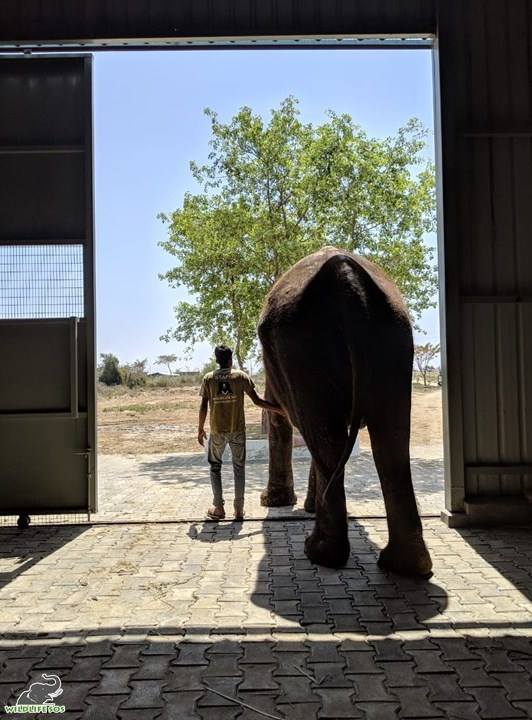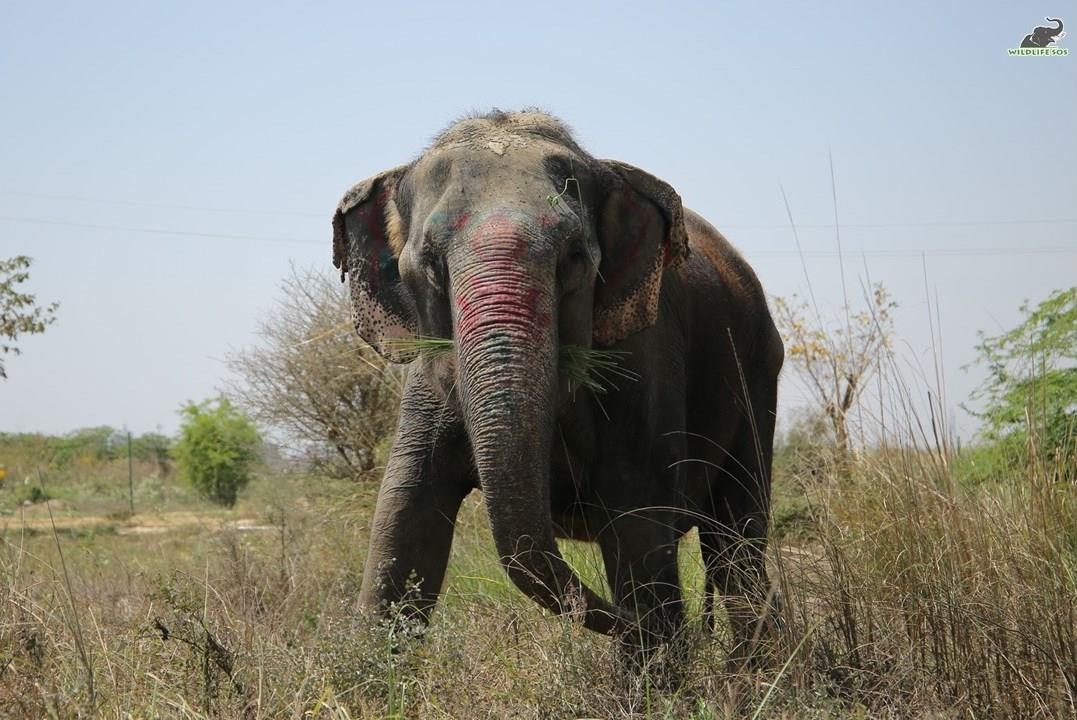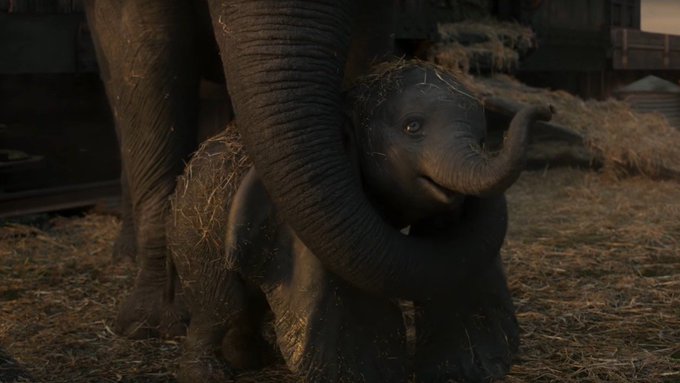Tim Burton asked to Give 'Dumbo' movie a Humane Ending, GetYourGuide Is Close to Helping Elephants & Kalpana steps into the sunshine and onto grass unchained for the first time ever with a Wildlife SOS in today's 'Elephant in the Room'

The picture says it all, when you think about it. Kalpana stepping out of the darkness, into the sunshine, with a Wildlife SOS caretaker at her side.
The elephant whose name means “imagination” leaves behind a life filled with almost unimaginable cruelty. Beaten with an axe, poked by a spear, forced to work everyday despite her pain, hunger, thirst, and exhaustion. Kalpana's days were dark, literally - thanks to almost total blindness caused by her mistreatment - as well as figuratively - 40 years made up of long, hopeless days.
Thankfully, her ordeal is over. Her new life has begun. And you made it happen. Like the caretaker in the photo, you are standing by her side, guiding her to the freedom she has so long deserved.
After this photo was snapped, Kalpana went for her first walk, chain free! It was clear she had never been out in an open, lush, green field before. Initially, she was lost and unsure, not knowing what she was supposed to do. After exploring the surroundings for awhile, she began joyfully uprooting grass and playing with twigs.
Let This Travel Company Know That All Direct Contact With Elephants Is Dangerous. GetYourGuide needs a push from compassionate people like you to stop offering tours that include visits to exploitative facilities that offer cruel elephant rides and other dangerous direct-contact activities.
GetYourGuide Is Close to Helping Elephants, but It Needs a Push
We were pleased when travel company GetYourGuide removed elephant rides from its platform quite some time ago—a compassionate and business-savvy decision that more than 50 other companies have made as well. Yet despite knowing that all camps that force elephants to give rides are abusive and that all direct contact with elephants is dangerous, it's still offering tours that include visits to these cruel facilities.
Excluding elephant rides from its itineraries is a great start, but continuing to offer visits to camps that force these sensitive, highly intelligent, emotionally complex animals to give rides, that shackle them in chains, and that make them come into contact with the public supports the very same abuse as offering elephant rides does.
This is what GetYourGuide is supporting by failing to remove abusive camps from its tours:
Ask GetYourGuide to make a truly compassionate decision and remove all direct-contact activities with elephants from its offerings.

What Happened When PETA Asked Tim Burton to Give Dumbo a Humane Ending?. PETA requested an update to the story by having Dumbo and his mother escape from a life of abuse and exploitation and live out their days in a sanctuary. Find out whether director Tim Burton took our suggestion to heart.
The trailer alone made grown adults weep. And now that Disney’s live-action Dumbo has arrived in theaters, we’re sure there won’t be a dry eye in the house by the time the credits roll.
But while an adorable, computer-generated elephant with big ears has audiences in tears, we need to remember that real elephants—and many other animals—continue to suffer around the world in the name of entertainment, including for movies and television shows. We reminded Dumbo director Tim Burton of this when we urged him to give the film an updated and humane ending by having Dumbo and his mother escape from a life of abuse and exploitation in Hollywood and live out their days in a sanctuary—as the situation for real elephants used in film and TV is one of deprivation and torment, just as it is in circuses. Without giving too much away, we’re pleased to say that in Burton’s universe, everything works out as it should for Dumbo and his mother. (But don’t be fooled: You will definitely still cry.)
Like makers of The Jungle Book, Jumanji: Welcome to the Jungle, and the upcoming live-action Lion King remake, Burton leverages computer-generated imagery (CGI) technology to portray stunning, realistic full-grown elephants (among other animals, such as a monkey, a bear, and some mice), meaning that these animals did not have to suffer—either on set or behind the scenes.
“Of course, we didn’t have real elephants in this movie—we had wonderful CGI people who created some magic. I mean, I’m super-proud to be in a Disney movie that promotes animal-free circuses. You know, animals are not meant to live in captivity.” —Eva Green, actor
This film offers thoughtful messages about animal rights, but that’s not all—in off-screen interviews, Burton and his star-studded cast have also been very vocal about their support for animals and why they don’t belong under the big top.
“It’s funny, but I truly never liked the circus. … You’ve got animals being tortured, you’ve got death-defying acts, and you’ve got clowns. It’s like a horror show. What’s to like?” —Tim Burton, director of Dumbo
Dumbo also exposes the dark side of the circus—from Michael Keaton’s character, who’s intent on exploiting Dumbo at all costs, to the humiliation and pain that animals experience when they’re forced to perform stupid tricks. While there have been some recent victories in the push to get animals out from under the big top, that comes as no comfort to the big cats, bears, elephants, and other animals still enduring captivity and abuse in circuses around the world.
“This film does make statements on the cruelty of the circus at that particular time, especially in relation to animals [and] if the idea of having animals live their lives in enclosures has any justification at all, which it doesn’t really …. There are certain establishments that I wouldn’t frequent that have been publicly maligned, and I think for good reason.” —Colin Farrell, actor
In their natural habitats, mother and daughter elephants stay together for life, and males don’t strike out on their own until adolescence. But separating mothers and their young is a common occurrence throughout nearly all industries that exploit animals. This moment of separation is the most heartbreaking scene in both the original Dumbo and the remake. (Listen to “Baby Mine,” the most tragic song in Disney history.) We hope audiences will be moved enough by this film and the bond between Mrs. Jumbo and her baby to stop supporting cruel establishments that continue to break families apart for the sake of profit.
After 36 years of PETA protests, Ringling Bros. and Barnum & Bailey Circus finally closed down in 2017. But circuses such as Garden Bros. and Carson & Barnes are still working with exhibitors that force animals—including elephants—to perform confusing and often painful tricks. Garden Bros. has also been the subject of a recent whistleblower report accusing its handler of “warming up” elephants by jabbing them with a bullhook or shocking them with a Taser before they came on stage.
Lights, Camera, Take Action!
Some animals are still suffering on film and television sets around the world. You can do your part by committing to never buying a ticket to a film that uses wild animals and by keeping shows that use them out of your streaming queue.
Like makers of The Jungle Book, Jumanji: Welcome to the Jungle, and the upcoming live-action Lion King remake, Burton leverages computer-generated imagery (CGI) technology to portray stunning, realistic full-grown elephants (among other animals, such as a monkey, a bear, and some mice), meaning that these animals did not have to suffer—either on set or behind the scenes.
“Of course, we didn’t have real elephants in this movie—we had wonderful CGI people who created some magic. I mean, I’m super-proud to be in a Disney movie that promotes animal-free circuses. You know, animals are not meant to live in captivity.” —Eva Green, actor
This film offers thoughtful messages about animal rights, but that’s not all—in off-screen interviews, Burton and his star-studded cast have also been very vocal about their support for animals and why they don’t belong under the big top.
“It’s funny, but I truly never liked the circus. … You’ve got animals being tortured, you’ve got death-defying acts, and you’ve got clowns. It’s like a horror show. What’s to like?” —Tim Burton, director of Dumbo
Dumbo also exposes the dark side of the circus—from Michael Keaton’s character, who’s intent on exploiting Dumbo at all costs, to the humiliation and pain that animals experience when they’re forced to perform stupid tricks. While there have been some recent victories in the push to get animals out from under the big top, that comes as no comfort to the big cats, bears, elephants, and other animals still enduring captivity and abuse in circuses around the world.
“This film does make statements on the cruelty of the circus at that particular time, especially in relation to animals [and] if the idea of having animals live their lives in enclosures has any justification at all, which it doesn’t really …. There are certain establishments that I wouldn’t frequent that have been publicly maligned, and I think for good reason.” —Colin Farrell, actor
In their natural habitats, mother and daughter elephants stay together for life, and males don’t strike out on their own until adolescence. But separating mothers and their young is a common occurrence throughout nearly all industries that exploit animals. This moment of separation is the most heartbreaking scene in both the original Dumbo and the remake. (Listen to “Baby Mine,” the most tragic song in Disney history.) We hope audiences will be moved enough by this film and the bond between Mrs. Jumbo and her baby to stop supporting cruel establishments that continue to break families apart for the sake of profit.
After 36 years of PETA protests, Ringling Bros. and Barnum & Bailey Circus finally closed down in 2017. But circuses such as Garden Bros. and Carson & Barnes are still working with exhibitors that force animals—including elephants—to perform confusing and often painful tricks. Garden Bros. has also been the subject of a recent whistleblower report accusing its handler of “warming up” elephants by jabbing them with a bullhook or shocking them with a Taser before they came on stage.
Lights, Camera, Take Action!
Some animals are still suffering on film and television sets around the world. You can do your part by committing to never buying a ticket to a film that uses wild animals and by keeping shows that use them out of your streaming queue.
A Don Lichterman non-profit organization dedicated to building a global community raising awareness of corruption, injustice and the need for action across a full range of issues impacting people and animal/wildlife welfare around the world, such as conservation, climate change, campaign law, lobbying, government action and rescue work. SAN’s vision is to create safer world, free from political, environmental, and social oppression, where all the inhabitants of Earth can live in harmony within their own natural environments.
Our companies are known for creating products that enhance people's lives. Through Sunset Corporation of America and its companies, we’re equally dedicated to improving lives. Our commitment extends to helping local communities, fostering better educational systems, supporting the arts and culture, helping disadvantaged youth, protecting and improving the environment, animal welfare, wildlife issues and encouraging employee volunteerism.
Activsim and Sustainability:
- Gun Safety & Gun Laws
- Cruelty Free
- Death Penalty
- Demand Action
- Sustainable Action Network
Fairness and Equality:
- Privatization
- Voters Issues & Gerrymandering
- Private Prisons & the War on Drugs
- Finance, Housing & the Economy
Corporate Responsibility:
- Candidates
- Bills, Laws & Protections
- Wildlife & Oceania
- Labeling & Transparency
- Comprehensive Captivity & Hunting Results Databases
Sustainable Action Network (SAN)





